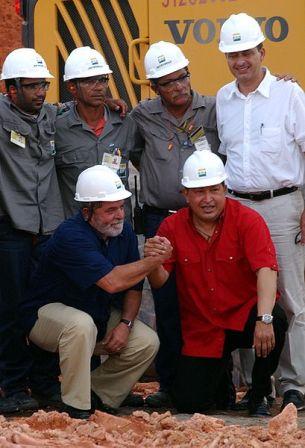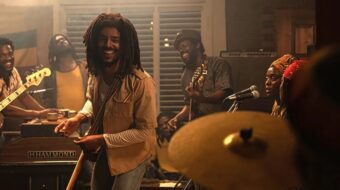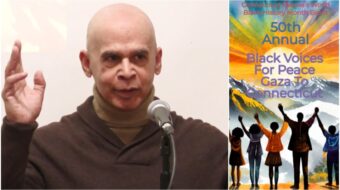
For Cuban President Raul Castro, the results were “historically transcendent.” It was “the unity project of Simon Bolivar and Jose Marti beginning to take institutional shape,” wrote Angel Guerra Cabrera of visionesalternativas.com.
Presidents and representatives of 33 Latin American and Caribbean nations met February 23 and 24 to form an organization provisionally called the Community of Latin American and Caribbean States (CLACS). The 21st Summit of the Rio Group and the Second Latin American Summit on Integration and Development convened together in Cancun, Mexico to constitute the new group.
Bolivian President Evo Morales and Venezuelan President Hugo Chavez had propelled the initiative with their call for a new Organization of American States (OAS) “without the North, without the empire, without the United States and Canada.” Even conservatively inclined Latin American leaders joined in, according to the analyst, because they reject the historic OAS tolerance of violent rule, invasions and coups.
However, Honduran President Porfirio Lobo was not invited, because several regional states still consider his November 29 election to have been illegitimate.
Organizational details of the new group will emerge at the next CLACS summit in Caracas in 2011. The group takes shape 200 years after the beginning of the anti-colonial struggle against Spain.
An 88 point “Declaration of Cancun” outlined goals, purposes and methods. It announced the intention of CLACS “to deepen the political, economic, social and cultural integration of our region”, and also to “act to promote sustainable development…within the framework of democracy, unity, solidarity, cooperation, political agreement, and unfettered respect for human rights”. The document “took note of “challenges facing small, vulnerable and highly indebted countries.”
The founding declaration catalogued specific sectors targeted for integration. Financial proposals came first, covering financial markets, funding for development projects, a common currency, and orderly debt repayments. Sectors to come under the continent-wide agreement include: energy, physical integration of infrastructure, science and technology, food security, hunger and poverty eradication, health care and clean water. Other categories are education and culture, migration, sustainable development, natural disasters, climate change, south-south cooperation, youth services and the fight against terrorism and narco trafficking.
At the concluding session, Mexican President Felipe Calderon, who hosted the meeting, anticipated the “promoting of a regional agenda in world forums, and being positioned more favorably in confronting global developments.” The conservative president opined that CLACS posed no threat to other nations and that Mexico would also continue as an OAS member.
Speaking to summit delegates and reporters, the heads of state offered disparate views. Brazilian President Luiz Inacio Lula da Silva rejected theories of anti-U.S. motivations, likening the situation to children who, coming of age, go their own way. Lula was alone in assailing the coup last June that removed Honduran President Manuel Zelaya. The Brazilian president professed optimism: There will be a U.S. government, he promised “that sees the uselessness of continuing” the blockade against Cuba.
President Chavez toned down anti-imperialist rhetoric and, to preserve unity, called for the CLACS to steer clear of political stridency. He foresaw the new organization as focusing on administrative aspects of integration.
At the end of the summit, Colombian President Alvaro Uribe interrupted a discussion on support for Haiti to assail Chavez verbally. President Evo Morales of Bolivia read the fracas as a provocation by Uribe instigated by his U.S. handlers. President Leonel Fernandez of the Dominican Republic and others engineered a temporary peace.
Commentator Cabrera marveled at the changes in Latin America since 1999, when Chavez was elected President of Venezuela. Socialist Cuba was alone then, under severe blockade, but now has joined the community of Latin American and Caribbean nations as a model of independence and an honored practitioner of international solidarity. Cuban President Raul Castro reminded the nation of “our America” (Jose Marti’s phrase) of the Cuban independence hero’s doctrine that “homeland is humanity”. He expressed appreciation for their denunciation of the U.S. blockade against Cuba, called for reconstruction and decolonization in Haiti, and joined the summit in backing Argentina’s claims to the Malvinas (Falklands) islands and their offshore oil reserves.
Photo: Brazilian President da Silva and Venezuelan President Chavez visit a refinery in Abreu and Lima, Brazil.Wikimedia/CC

MOST POPULAR TODAY

High Court essentially bans demonstrations, freedom of assembly in Deep South

Resource wars rage in eastern Congo, but U.S. capitalism only sees investment opportunity

U.S. imperialism’s ‘ironclad’ support for Israel increases fascist danger at home

UN warns that Israel is still blocking humanitarian aid to Gaza







Comments